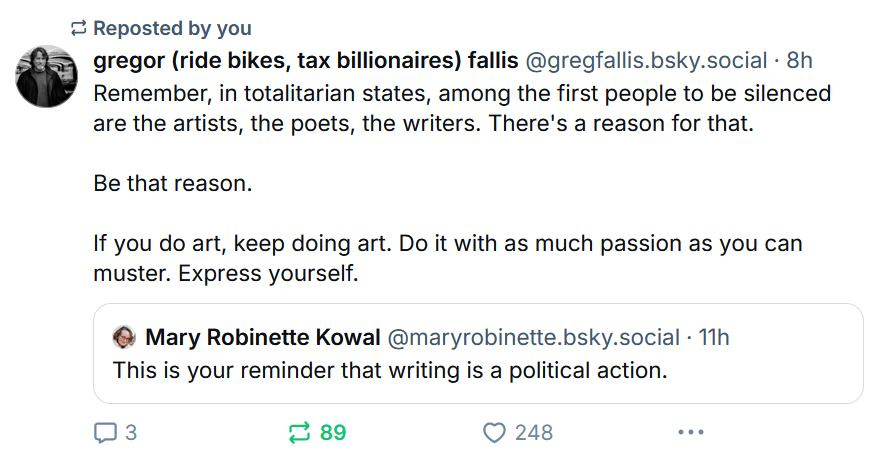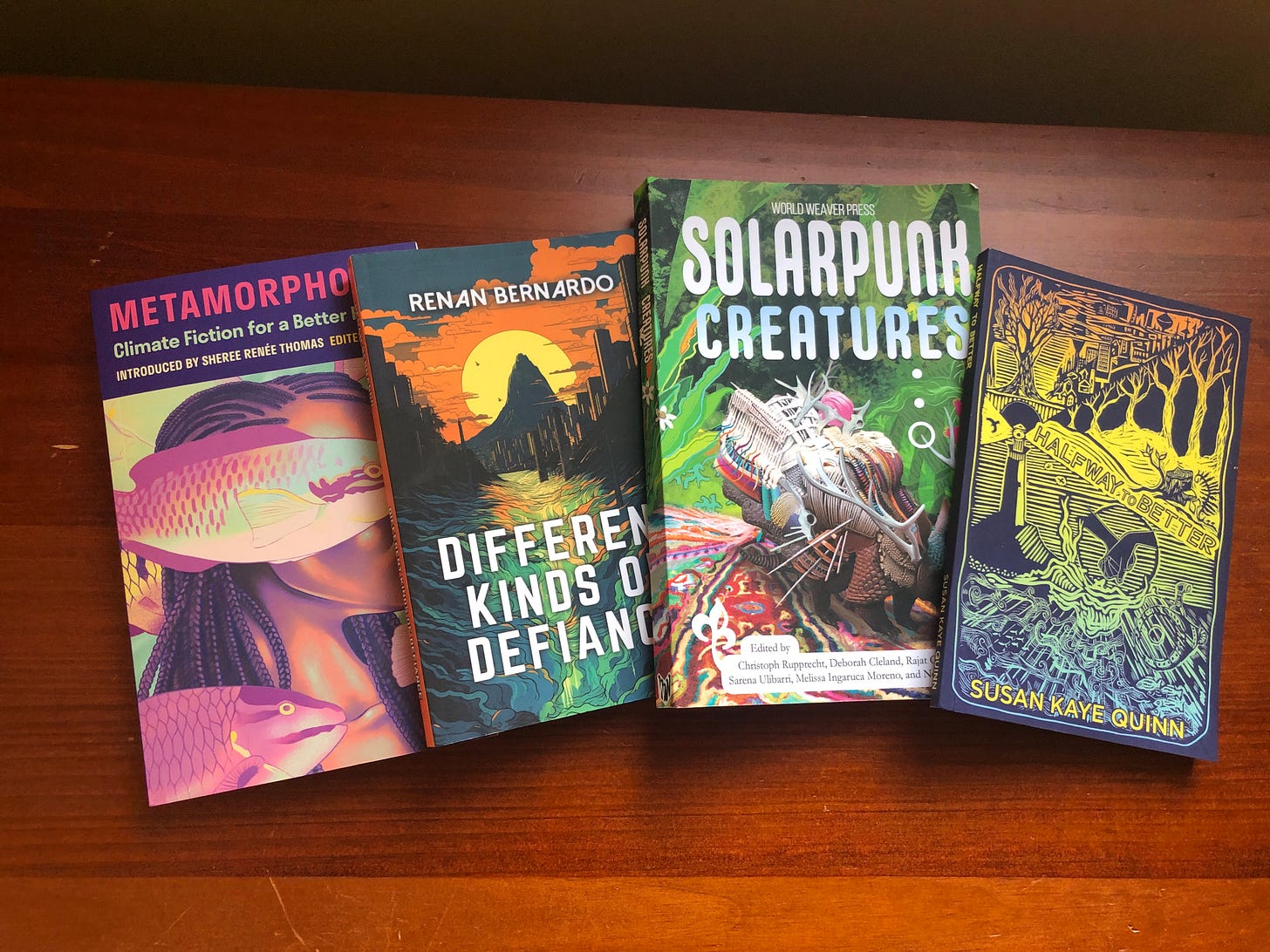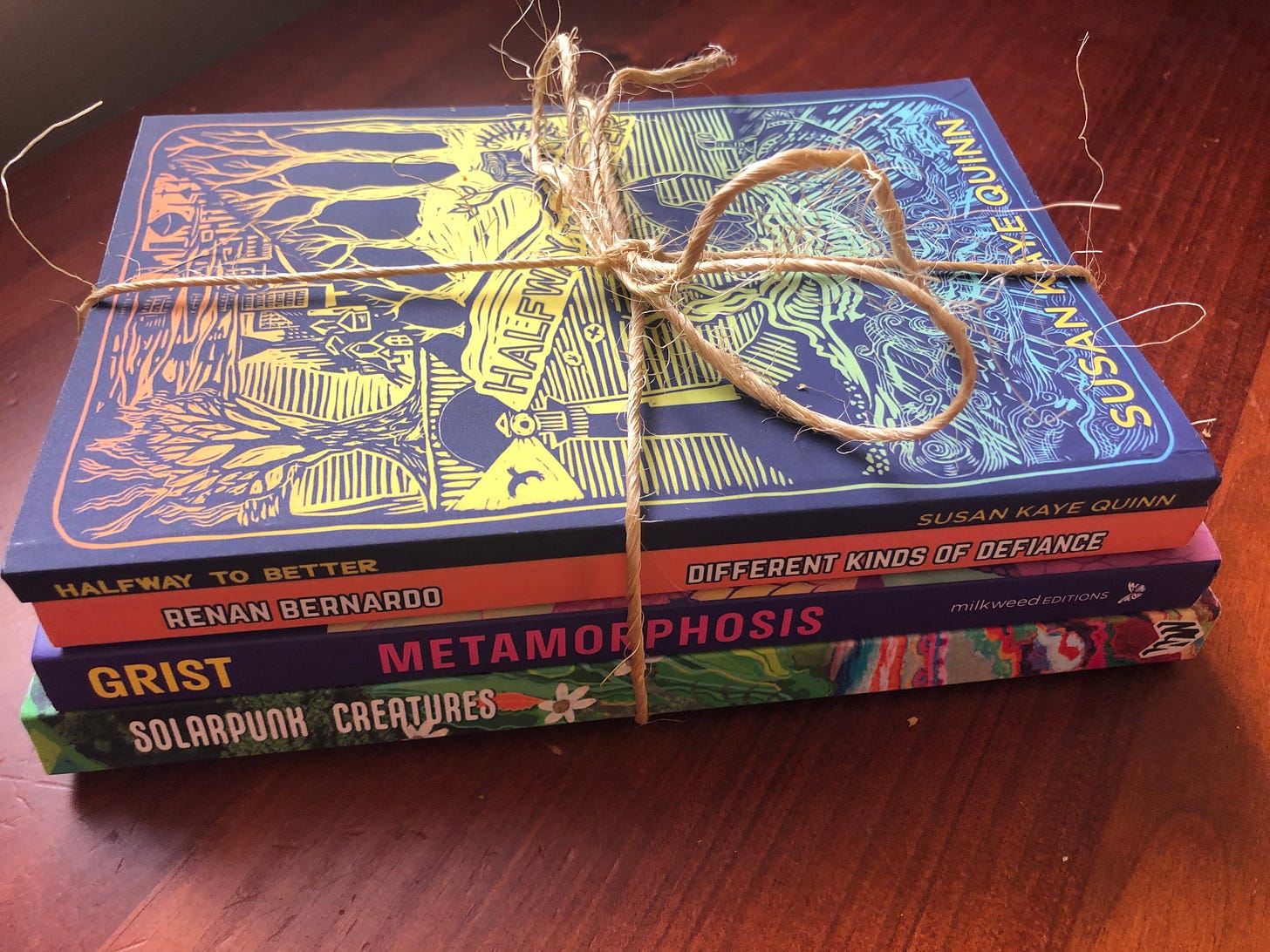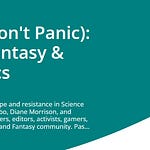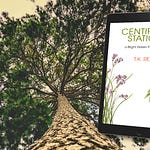Hello Friends!
Welcome to Bright Green Futures, Episode Twenty-Two: Building Resilience for the Future (and Today)
I created Bright Green Futures to lift up stories about a more sustainable and just world and talk about the struggle to get there.
I’m writing this podcast in the wake of America voting Trump back into office, which is objectively terrible for the country and the world.
No one won. All of us lost—the country, the world, the climate—it’s just that some of us haven’t realized it yet, may never understand it, and wouldn’t admit it, if they did. The suffering will be horribly unequal with the least responsible suffering the most, which is, of course, how it always goes with colonialist and capitalist economies and power structures and how climate impacts are felt as well. Inequality is the explicit stated purpose of fascism, and we just voted a fascist regime into power in America. Again.
Like everyone else, I’m grappling with what to do now.
I’m not going to cover all the terrible things Trump has promised to do. I shouldn’t have to tell you Trump will roll back any climate progress he possibly can. A Trump administration will burn through an ungodly amount of carbon, immediately and in the years ahead, and we were already out of time. We desperately need to reduce emissions, but Trump will accelerate them. He will give a free hand to all industries, not just the fossil fuel adjacent ones, especially with his new billionaire buddies in Silicon Valley and their plans for exponentially more energy-burning AI.
All of this will have horrible consequences for the climate.
This is a given.
America is facing some dark days, with horrific implications for the rest of the world, in both geopolitics and the climate fight.
So the question becomes: how do you survive in that world? A world where the most powerful nation on earth had a choice and it chose the bad path. A world where everything that’s broken will be further smashed, intentionally, by the rich and the privileged and the bigots, who are already reveling in the terror they can invoke in others.
Some of us won’t make it. There will be a lot of suffering.
This entire podcast is about creating and lifting up hopeful near-future climate stories.
How can we possibly do that in the face of this dark time?
Well, during the 4 years between authoritarian regimes in America, I devoted my time to telling these kinds of stories, and that process of imagineering, as well as living solarpunk values as much as practical in my non-fictional life, in which I still exist inside the cage of capitalism, led to me learn lots of practical things about living sustainably and building a better world—for myself, for my community, for the biosphere. It turns out that was exactly the right way to prepare for this moment. I thought I was figuring out how to survive climate change, but it turns out I was learning how to build resiliency against all kinds of bad things, including the fascist takeover of America.
The tools for fighting the climate crisis are also tools for fighting fascism. Ultimately, they have the same source and present the same risks.
Before I dig into that, here’s a couple basic reminders. Things you already know, or should, but that we all need to be reminded of:
#1: Do not obey the tyrant in advance
I’m quoting Timothy Snyder’s excellent On Tyranny, which I read the first time we voted our Discount Mussolini into the White House. I recommend getting a copy of the book from bookshop.org rather than Amazon, given Bezos violated Rule #1 even before the election, cravenly courting Trump by spiking the Washington Post endorsement and then lavishing praise on Trump after the election. On Tyranny is a good guide on how to fight fascists not kiss their behinds. I’ve also been told the audiobook has an update from the original book that’s worth listening to.
#2: Keep making art
Author Mary Robinette Kowal posted shortly after the election: “This is your reminder that writing is a political action.” That’s something we’re pretty clear about here on the pod. Gregor Fallis added: “Remember, in totalitarian states, among the first people to be silenced are the artists, the poets, the writers. There’s a reason for that. Be that reason. If you do art, keep doing art. Do it with as much passion as you can muster. Express yourself.”
Overnight, what I do became a lot more radical, all without me changing a thing—and I thought I was radical before! But I’ve known since the first time this clown car rolled into DC that being a writer, especially an outspoken one on social media, doubly so because I was a woman, was a dangerous occupation... but an important one. Given how many Silicon Valley billionaires are cozying up the tyrant, and the current and future state of our surveillance capitalism, speaking out on social media (or podcasts) is potentially dangerous for a lot of people. At some point, I might have to go dark to protect the people I love.
This is not that time. See Rule #1.
Two important caveats to that: 1) it’s pretty much impossible for me to erase my digital footprint; I’d have to unpublish a lot in order to disappear from the tyrant’s gaze and I have no intention of doing that, but 2) if you’re doing some kind of resistance organizing, be smart. Get on Signal. Don’t do anything on Facebook. Seriously. Educate yourself and be safe, friends.
How We Survive: Build Resilience
But beyond those pointed reminders, I want to talk about the questions that have been ricocheting around my friend groups and online and in my inbox and private messages. What do we do now? How do we survive? How do I protect the people I love? How can I fight this without losing what’s left of my sanity?
Those four years I spent studying how to build a more just and sustainable world have given me some answers, but I was surprised to hear people instinctively reaching for them. Things like building community and network with your people and put your oxygen mask on first.
People are using the language of solarpunk values, even if they’re not using the word, to reach for the solution they instinctively know works: huddle up, work together, help each other out.
I want to go into some detail about what that looks like, but this is exactly why I’m going to keep writing these stories: because they are, in fact, the answer.
People are going to discover that first hand, through lived experience in hard times, but these stories can help shine the way. And give uplift. And build some permission structure for living life in a different way, even right now, in the midst of capitalism and the authoritarian takeover. Especially now.
Believe me when I say the most radical thing we can do is take care of each other.
You build resilience by putting your oxygen mask on first, creating a rock solid base of your own emotional and physical resilience, then starting right where you are, with the resources and tools you have right now, build the connections necessary to survive.
I’m going to dig into that in detail with what I hope are some practical tips, but first I want to make the argument for why this isn’t just some cliché “we’re all in this together” kind of platitude and why I believe that the tools I’ve been using in the climate fight are the ones we need to fight, resist, and survive the fascist regime.
Climate Tools are Survival Tools
Those of us who have survived 4 years of Trump and now 4 years of pandemic have adapted in some way. Not in the tech bro “adapt or die” approach, which just means “use my shitty app or else!” but a real adaptation to a changing world. That adaptation is not always positive and it bears repeating that not everyone survived. Way too often our “adaptations” have been denial (especially with COVID) or maladaptive behaviors that eventually hurt us more. Or simply a hypervigilance that erodes our sanity and our health and eventually manifests as physical and/or emotional breakdown.
I’ve done all of those, in case you think I’m holding myself out as some adaptation genius. It’s more accurate to say I did all the wrong things on my way to figuring out what actually works. I’ve been that person who tried to single-handedly save everyone and everything, who remained hypervigilant for way too long, who had horrible losses and emotional breakdowns and physical breakdowns, sometimes all three at the same time.
Fun times, friends! Fun times.
This is how I know deep in my bones how much connection isn’t optional, community is vital, and the most precious resource we have is each other.
Over the last 4 years, as I really dove into imagining a way out of the climate crisis—what it would actually take, what that future sustainable world really looked like—I realized the absolute magnitude of what we were facing.
The climate crisis is a crisis. I’ve deeply understood for years, that we were barreling over a cliff and needed to move insanely faster than we were and that no matter how much I pushed that rock uphill, not only could I not do it alone, I could only do my part. And even figuring out my part was tremendously difficult (you can hear my advice about that in Episode 21 on the pod.)
That’s where a lot of people drop into doomerism or just feel inconsequential in the fight. But that’s not at all the conclusion I came to: I believe we need both individual and collective action to get things done. We have to radically change at every level of society. I wasn’t just exploring this in fiction and envisioning the future, I was constantly exploring what I, as an individual, could do right now today and constantly finding the hard limits of that—the limits above which only collective action could be effective. I could get solar panels on my house, but I couldn’t if I was in an apartment. Or in a state without community solar. Or if my HOA suddenly outlawed solar, which is happening right now in my neighborhood. In some states, it’s illegal for HOAs to restrict solar, but not Pennsylvania. That’s where a change in the laws or even enforcement of the laws that already exist is the only way to tackle the problem. I can filter my water but I can’t keep the chemical plant from dumping toxins in the river in the first place—for that, I have to force the government to do its damn job.
Under a Trump administration, the job of government will be to encourage the chemical plant to dump even more toxins in the water. This will have to be fought collectively, but in the mean time, definitely still filter your water. Hopefully, that’s obvious.
The hard limit on individual action does not in any way mean you shouldn’t do everything you can—doing so will make the line very clear and maybe make you angry enough to work collectively for change.
That was a struggle even under the Biden administration—even with the IRA being the most radical climate legislation ever passed in America, it wasn’t doing anywhere near enough. And time was running out. I was doing everything I could, but most people weren’t, and still aren’t, and now America has voted in a fascist regime that will accelerate the climate crisis.
Yes, I’m angry about that.
Fascism is a disaster for climate, but I’ve known all along that it was already too late to prevent the catastrophes. We were already having them—the floods, the fires, the hurricanes, all driven to insane intensity by the hottest years on record—and the costs were climbing, setting new records every year. More was coming and it would get worse. A lot worse. We could—we must—still work to decarbonize but no matter what, there will be carnage.
All of my climate work, all the stories and activism and personal action, was all about mitigating the damage as much as possible, both by working feverishly to decarbonize every sector of our lives and by starting to build the resilience we would need to survive what was coming.
And this was all before Trump’s return to power, which is a wrecking ball on the progress we’ve managed to scrape together so far.
So I already had the perspective that what was coming with the climate was bad… and those were the risks that we knew. There was a huge amount of uncertainty as to exactly how bad and in what way and how to even begin to prepare. If you assume the worst rainfall is going to be twice what you’ve ever experienced before and you build overflow capacity for that and then the climate comes along and dumps five times your previous record… your plans go washing down the mountain.
You’ve got to plan for things you can’t plan for.
And the name for that is: resilience.
Resilience comes from human infrastructure: people working together, caring for each other, connected to one another so they can problem solve when the problems arise and they have resources they can share and figure it out.
The basic unit of resilience is family—people instinctively reach there first, if they can. If they have families that are intact and that they can rely on. Many don’t, especially with the rise of fascism turning family members against their own in this vast cultural battle. So the next unit of resilience is your network, your friends, the people you trust like family. Most people have some of that, but capitalism and increasingly disinformation and the fascist movement relentlessly work to isolate us, break connections, and never let us get a moment’s breath to be able to make those connections.
If you have a properly functioning society, you might have resilience at even larger scales: maybe your community has third spaces and good governance and great emergency planning and they don’t just assume everyone can meet at the stadium during an emergency when the stadium is located along the river and will be the first to flood. (Hello, Pittsburgh! Love ya! You need a better Climate Action Plan!)
Most communities have very inadequate preparation for what’s coming.
But connections that provide resilience can be—and almost always are—built in the moment, when the emergency arises. Resilience looks like pods in the pandemic and people pitching in to help out in Asheville and found families and community centers and knitting groups and climate cafes. There are a thousand ways people are finding to connect and support each other with love and information and resources.
Connection is resilience and it is how we survive.
It’s how we survive the catastrophes the climate will throw at us and it’s how we survive an authoritarian regime that will do the same.
There’s a hidden part to this too—a part that’s not just managing a disaster or getting through the immediate crisis. Building those bonds of resilience also provides connection and joy and cures loneliness and empowers people to do good things, things that help others, things that make life worthwhile. Things the tyrant can’t stop you from doing, like planting native seeds in your garden or giving blankets to the homeless or playing D&D with your friends and bolstering everyone through these hard times.
The tyrant can’t stop me from writing stories about a future worth fighting for.
At least not yet. See Rule #1.
There is so much you can do without having to wait for an election or permission from someone, and I’m not even talking about movement building or community “organizing” much less political organizing or general resistance. I mean building resilience by building out that human infrastructure: doing things right now, today, with your friends and family and community to make things better. We can help each other find ways to mitigate the terrible things, all the harms already here and all the ones that are coming. Each of us can find ways to opt out of capitalism, like Buy Nothing groups or gift economies or even just helping out when you can.
Mutual aid is just being a decent human to your friends.
I was struck by a recent post from a trans lifeline about how, in their experience, resiliency and survival was often more about determination and imagination and connection than money or actual resources. And that really resonated with me. Yes, resources are important. Money and information can make a huge difference. But connection matters more—in fact, connection is how you unlock everything else.
And that’s just as true in surviving the fascist threats as it is in surviving the climate disasters.
So hopefully I’ve made the argument for why these things are connected and how resilience and human infrastructure and connection and community are the connective tissue that binds them together. As I said at the top of the podcast: the tools for fighting the climate crisis are also tools for fighting fascism. Ultimately, they have the same source and present the same risks.
So Let’s Get Practical
Now I want to tackle some practical questions about what that means and how to move forward. This podcast is already long and I’ll no doubt be expanding on this as we live through these interesting times we are cursed with, but I want to leave you with some practical things to help ground you.
#1—Let Go of Hypervigilance You do not need to know every little thing the fascists are up to every minute of the day. In fact, that fire hose of terror is well orchestrated to immobilize you and transfix you to your screen, unable to do the thing that would undermine their efforts to harm people. They literally try to terrorize people into submission so if you don’t give them your attention and spend that energy on helping other people be safe, or simply going for a walk in the woods, you’re double winning. Fuck the fascists and their needy need for your attention.
#2 —Be Savvy About Being Reactive Do you really need to stock up on beans? How about finding your local farmer and buying a farm share for next year instead? On the other hand, definitely get your passport renewed, vaccinations up to date, and any healthcare you’ve been putting off. Be savvy about which actions are actually helping, good sensible things to stay safe and be prepared, and which are giving the illusion of control and possibly just causing a run on toilet paper for no reason at all.
#3—Prioritize Your Mental Health Get lots of joy and rest and exercise and time with friends. Turn off the news. Survival is resistance, and if that’s all you do, you’ve done a lot. I mean that very seriously because there are a lot of us who are precarious or vulnerable and that might be you or it might not be you, but either way, that is not your fault. Ditch the guilt. You need to ensure your own survival so someone doesn’t have to come rescue you. Remember that terrorizing people is the favorite tactic of fascists, so just denying that is a win. It’s completely normal to feel anxious and afraid, but the real cures for that are connection, time with friends, taking in all the arts, time in nature, and just having some fun. Fascists hate fun, especially when you have it. So have extra fun to spite them.
#4—Do What You Can (and there is no “most important” thing) Like I talked about in Ep. 21, Doing Your Part (in the Climate Crisis), there is no “most important” thing in fighting the climate crisis. There’s simply too much to do and it all needs to be done yesterday. So do what you can, right now, with the skills and connections you have. Pick something and get busy. Get grounded and safe and build from there. You can’t do everything. Do not try. Do not reinvent the wheel. You don’t need to do a ton of research to figure out how best to help. You don’t need to start something new. Start with the people you know, the groups you’re already connected to. Check in with them. How are they? What do they need? Start close and work outward. You don’t need to do everything at once, and make sure you leave time for joy and rest and all the things that keep you afloat.
#5—Take Time To Build Resilience There are many super important things that are slow, hard work, like building friendships and connections, proving you’re safe for people to reach out to, developing meaningful relationships where you both know you can count on each other to help. Maybe that looks like taking a volunteer shift at the community garden or joining a class in how to grow the tomatoes that you're going to plant next spring. This is the human infrastructure we need to build. It’s hard work but again, start where you are. Everyone needs these connections, everyone’s looking for it especially right now, and it’s the key to surviving the times ahead. If you don’t have a lot of connections, now is the time to start building them. Or renew ones that have lapsed. Or reach out to create a sparkling new friendship that just might be what you both need to get through this.
And finally, I’ll make one more pitch to read the stories that this podcast is built around. Actually read them. They have so much to offer in terms of inspiration and blueprints for the future, but they also do that thing that art does: reminds us of the good things, the things we all want, the things worth living for.
As the patron saint of the pod, Ursula K. Le Guin said:
The entire point of these stories is to threaten the status quo brutality of the world.
I can think of nothing more radical to do right now.
Send this episode to a friend who might be struggling with the world right now, as so many of us are. Maybe that will be the first step in building a new connection.
Check out the Featured Stories and Hopeful Climate Fiction lists for further reading. The best way to support the show is to subscribe and share the stories with your friends.
LINKS Ep. 22: Building Resilience for the Future (and Today)
On Tyranny by Timothy Snyder
Rewriting the Future (Susan Kaye Quinn, DreamForge Magazine)
PLEASE SHARE
MAKE SURE TO ENTER NOVEMBER’S GIVEAWAY
This Solarpunk Starter Pack gives you a great sense of what hopeful climate fiction can look like in short-story format. I’m giving away the set to one lucky winner, but you can snag copies for yourself using the links below.
WIN A SOLARPUNK STARTER PACK
YOU MUST BE A SUBSCRIBER OF BRIGHT GREEN FUTURES TO ENTER:
OPEN TO US/CANADA only for shipping costs. GIVEAWAY ENDS NOVEMBER 30th.
If you can’t wait to win, you can purchase the Solarpunk Starter Pack here:





